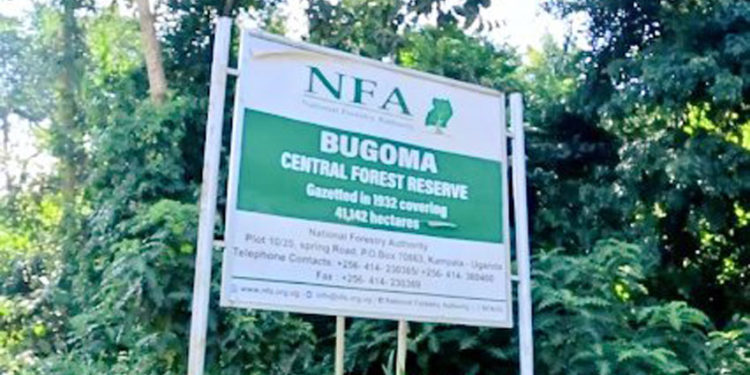Nestled within the picturesque landscape of Kikuube district, Bugoma Central Reserve Forest once stood as a testament to nature’s grandeur, boasting a lush tapestry of biodiversity beneath its towering canopy.
Yet, today, this verdant oasis lies vanquished, reduced to a desolate expanse of barren land, a victim of unbridled human exploitation.
Traversing the villages of Kabwoya and Kyangwali sub-counties paints a harrowing picture of destruction, as the once majestic forest now lies in ruins, with “logs of trees felled to the ground” serving as grim reminders of its former glory.
In their place, sprawling fields of maize, beans, irish potatoes, and sugarcane now dominate the landscape, erasing all traces of the forest’s once-thriving ecosystem.
The once verdant path leading to Kyangwali through Nyakabale now stands bereft of its former splendor, as the “dark shades” cast by towering trees have been replaced by an eerie emptiness, with only a handful of diminutive saplings struggling to survive amidst the desolation. Astonishingly, this wanton destruction unfolds under the ostensible guardianship of armed security officers, tasked with safeguarding the forest from encroachers.
However, allegations of corruption within the ranks of the National Forestry Authority (NFA) cast a dark shadow over these supposed guardians, with locals like Desire Nkurunziza leveling accusations of complicity against government officials.
According to Nkurunziza, some officials “don’t want Bugoma forest to exist” due to the illicit gains garnered from nefarious activities within its bounds.
Further fueling suspicions of collusion is the clandestine leasing of forest land to army personnel and NFA officials, with exorbitant fees exchanged behind closed doors, leaving no paper trail to trace the illicit transactions. This clandestine trade in forest resources only serves to exacerbate the plight of Bugoma forest and its surrounding communities.
Meanwhile, the residents of Kiryanga village find themselves at the mercy of an unfolding environmental catastrophe, as the encroachment of Bugoma forest for sugarcane cultivation unleashes a cascade of calamities.
Unpredictable rainfall patterns and soaring temperatures wreak havoc on agricultural practices, while the surge in pest invasions decimates crops, plunging the region into a state of despair.
For Mathias Tugumisiriize, a farmer whose Irish potato garden falls victim to marauding army worms, the devastation hits close to home as he grapples with the prospect of supporting his family in the face of mounting losses.
“My Irish Potatato garden survived drought. Now, it is being destroyed by the army worm. The Irish I planted in the other garden failed to germinate . This is a disaster and we have never experienced it in our lives, those who are threatening our forest [Bugoma] should leave us alone,” Tugumisirize reckons.
His anguish finds resonance with John Mugabo, the LC1 Chairperson for Kyabayanja village in Kikuube district, who grimly predicts an imminent famine fueled by the onslaught of storms, pests, and diseases ravaging the land.
Amidst the chaos, authorities offer feeble reassurances, with the Chief Administrative Officer (CAO) Dorothy Ajwang deflecting blame and the Resident District Commissioner (RDC) Amran Tumusiime evading inquiries, leaving residents to fend for themselves in the shadow of the impending catastrophe.
“Of course there is some connection between forests encroachment and climate change, but the situation cuts across the whole country. For matters of Bugoma, consult the RDC ,” says Ajwang.
In the corridors of power, MPs from the Buganda caucus raise their voices in protest, decrying the government’s complicity in the destruction of Uganda’s forests and lambasting the National Forestry Authority for its role in the unfolding tragedy.
In a phone interview with Hon. Muwanga Kivumbi, the Chairperson for Buganda caucus on environmental conservation, he remarked that the destruction of Uganda’s forest cover is unstoppable, because people mandated to protect these forests are ones at the forefront of their obliteration, chiefly officials from National Forestry Authority (NFA)
“National Forestry Authority is National Forestry destroying authority, because employees of NFA are the very ones at the forefront of allocating themselves chunks of land in these forests. You can’t send a dog to take care of the meat,” reveals Hon. Kivumbi.
As Uganda’s forest cover dwindles to alarming lows, from 24% in 1990 to a mere 10% by 2017, the absence of concrete action to address this crisis spells doom for the nation’s ecological future.
Against this backdrop of greed, corruption, and environmental degradation, the struggle to safeguard Bugoma forest emerges as a defining battle in the fight to preserve Uganda’s natural heritage for generations to come.
Do you have a story in your community or an opinion to share with us: Email us at editorial@watchdoguganda.com













